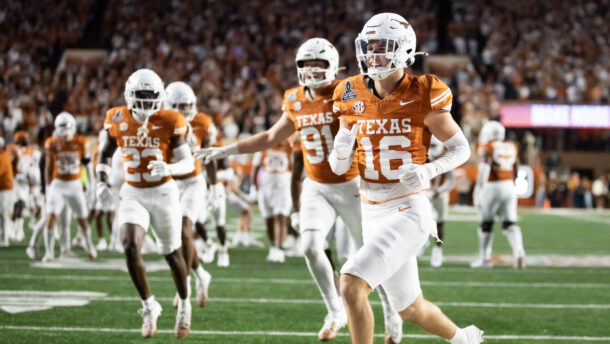The discussion surrounding Will Muschamp’s job status got us thinking Saturday.
Fans tend to call for change pretty often, and the mob mentality doesn’t think about consequences. So what goes into making that decision, and when is it appropriate? We put the question to the SDS staff.
WHEN IS IT A GOOD IDEA TO FIRE YOUR COACH MIDSEASON?
Jon Cooper (@JonSDS)
It truly depends on the football program and the coach. If the athletic director knows for certain the coach is gone after the 2014 season anyway, why not get ahead on the coaching search and start having conversations. In Florida’s case, unless Will Muschamp won out, he wouldn’t return. So, if ADs know for sure they are going to let the coaches go anyway, it’s better to cut bait now and start the grueling process of looking for another home run hire. But it truly depends on every program, AD and head coach as to when the best time to fire your coach truly is.
Brad Crawford (@BradCrawfordSDS)
When it’s apparent the program is heading in the wrong direction and support for the current regime is in decline, it’s time to pull the plug. It’s a slippery slope when there aren’t many available candidates better than what you already have, but oftentimes acting now and asking questions later is the most optimal choice. If there’s still booster, player and fan support for the incumbent, you must be able to envision the end game and ultimately where you think the program will be at the end of the regular season and beyond.
Chris Walsh (@CrimsonWalsh)
There’s really no such thing as a good time to fire a football coach when a season is still going on, but three exceptions stand out: 1) He’s already lost the team and there won’t be much of a recruiting hit anyway; 2) He does something to violate the personal conduct clause in his contract (i.e., he’s been real bad); or 3) You already know who you’re going to hire next and can’t afford to wait. Contract issues can also come into play, but interim coaches seldom seem to work out.
Ethan Levine (@EthanLevineSDS)
If a coach loses his locker room midseason, it is often a sign he needs to be fired sooner than later. A coach’s knowledge, beliefs, tendencies and preparation all mean nothing when the players do not respect him or respond to what he’s seeking from them. This is not to say any miscommunication between a coach and his players warrants a firing, but once the disconnect between a coach and his players becomes the established culture within the program, it is impossible to come back from. If a team is under-achieving on the field, but the team is still responding to the coach, that coach deserves to keep his job until the end of the season. There’s no point in making a change during a season if the players like the current coach. However, once the coach loses the locker room, there’s no reason to wait.
Brett Weisband (@WeisbandSDS)
Once it becomes clear a coach has lost control of his team, it’s time to let him go. If you’re thinking about firing a coach midseason, your team is clearly past the point of contention, so you don’t have to think about how it could affect your record. By keeping a coach around too long after the team has tuned him out, it’s only going to hurt the program. You don’t want your senior leaders tuning out and you don’t want your young players thinking about transferring. Additionally, players talk, and you don’t want the kids in your program talking to the recruits they know telling them how ugly things have gotten inside the program. In a big time college football program, the few million you sacrifice to can a coach is worth saving the damage you can do to the program.
Jordan Cox (@Jordan_Cox)
I don’t think there’s a firm answer to that question … I think it’s a situational decision.
In the circumstance of Will Muschamp, I think there’s no other choice. Athletic directors fire coaches in-season only to get fans off the back of the program. However, we saw a team that had quit on its season Saturday night and because of that, Muschamp has to go.
However, with that decision comes the disposal of this season and the commitment to beginning a new rebuilding phase with whoever is hired. Most of the time, ADs hire the opposite of what they currently have. With a defensive coach in place, an AD would most likely hire an offensive coach. That means new recruits and totally different philosophies.
Either way, it’s a lose-lose situation.
Jason Hall (@JasonHallSDS)
In year three when there is no signs of progress. In a situation like Florida, pulling the trigger could save the season. However, the current state of the program seems to be a continuous free fall. Using an interim head coach could also provide a potential candidate, rather than go through a long coaching search.
Drew Laing (@DLaingSDS)
It’s very rare to benefit from firing a coach midseason.
Unless, it’s a very toxic situation…that’s the ultimate signal of giving up on the season and not only would that have an incredible impact on your team, but also on future recruits, especially the ones in the upcoming class. However, if keeping the coach around is only going to keep digging the program in a bigger and bigger hole, then you get rid of him. If you know you’re going to fire him and keeping him around longer will just make things worse in-season, it may be prudent to cut your losses quickly. That way, the AD or whoever is in charge of hiring the next coach can certainly do his due diligence throughout the rest of the season.
It’s never a good thing to fire a coach midseason, but sometimes it is a necessary action.
An itinerant journalist, Christopher has moved between states 11 times in seven years. Formally an injury-prone Division I 800-meter specialist, he now wanders the Rockies in search of high peaks.







